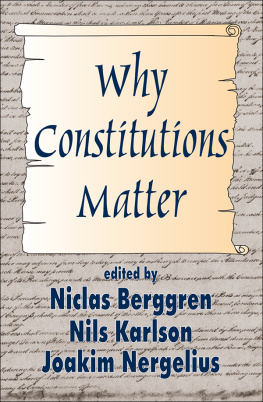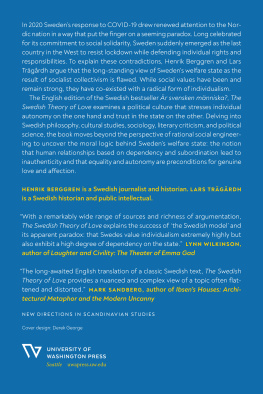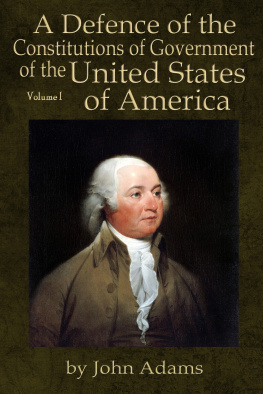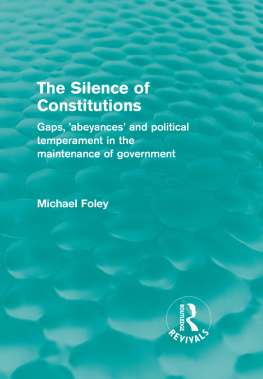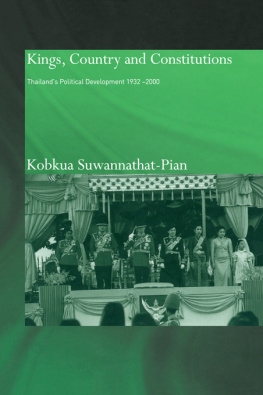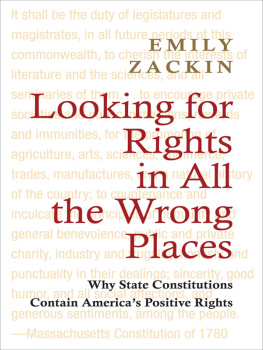First published in 2002 by Transaction Publishers by arrangement with City University Press, Stockholm
Published 2017 by Routledge
2 Park Square, Milton Park, Abingdon, Oxon 0X14 4RN
711 Third Avenue, New York, NY 10017, USA
Routledge is an imprint of the Taylor & Francis Group, an informa business
Copyright 2000 the authors and The City University of Stockholm.
All rights reserved. No part of this book may be reprinted or reproduced or utilised in any form or by any electronic, mechanical, or other means, now known or hereafter invented, including photocopying and recording, or in any information storage or retrieval system, without permission in writing from the publishers.
Notice:
Product or corporate names may be trademarks or registered trademarks, and are used only for identification and explanation without intent to infringe
Library of Congress Catalog Number: 2001053506
Library of Congress Cataloging-in-Publication Data
Why constitutions matter / edited by Niclas Berggren, Nils Karlson, Joakim
Nergelius.
p. cm.
Originally published: Stockholm: City University Press, 2000.
Includes bibliographical references.
ISBN: 0-7658-0924-9 (paper.: acid-free paper)
1. Constitutional law. 2. Rule of law. 3. Democracy. I. Berggren, Niclas. II. Karlson, Nils. III. Nergelius, Joakim.
K3171 .W49 2002
342. 02dc21
2001053506
ISBN 13: 978-0-7658-0924-7 (pbk)
The rule of the people is the essence of democracy. So why should there be formal constraints that regulate and even limit this rule? When and why do constitutionalism and democracy go hand in hand? Could constitutionalism even be seen as an essential component of modern democracy? And what are the effects of these constitutional rules? Why do constitutions matter?
The theme of the present volume, Why Constitutions Matter, makes clear that the basic political institutions play an important role for how a society and a political system function. For instance, the design of the constitution affects who gets to exercise power and who does not, who wins and who loses in the political game. The rules deciding the type of electoral system used, as well as how votes in the legislature are to be run and how governments are to be appointed and discharged, have fundamental effects on the political game.
But the constitution means more than this. Its design also affects how laws and policies are formed, irrespective of who is in power. It introduces limits on and legally binds political power. It affects how the political process functions and its results.
The constitution is thus an important (or even the most important) part of societys basic system of rules. Its rules constitute a kind of basic norm for other laws and rules, for the judicial system and legal application, and therefore also for citizens sense of justice and for the forming of norms. Most importantly, perhaps, the constitution regulates the relationship between the state and the individuals in a society and can hence be seen as a kind of contract between those in office and the people.
Consequently, the constitution is of great importance for how the political system, the economy, the rule of law, and the formation of norms work in a society. A societys long-term welfare seems highly dependent on its institutions. If suitable institutions are missing, or if present institutions are designed in a faulty manner, a society functions worse than otherwise. Such a conclusion receives strong support from research results in the neo-institutional tradition in the social sciences.
Consequently, there is a growing international interest in constitutional issues. The new democracies in Eastern Europe, Asia and Southern Africa are in a process where the recently introduced democratic institutions find their form and content. Several well-established democracies, such as Italy, the UK and New Zealand, have made major constitutional revisions in later years. Constitutional social engineering is increasingly seen as one of the most important methods to improve the working properties of democracies, economies, and the rule of law.
This does not, of course, imply that constitutions are the only things that matter for how the political process, or society, functions. Ideas, ideologies, technological developments and so on, are of course also of major importance. The point is that institutions and constitutions do matter, to some non-negligible extent, and that they, therefore, are suitable objects of study in the social sciences.
Still, scientific knowledge of these issues is unsatisfactory. Admittedly, an increased interest is noticeable, but not much research has been done as yet, especially not with an interdisciplinary approach. To help counter this, the City University of Stockholm has initiated the research project Democracy and Constitutionalism, sponsored by The Foundations of Torsten and Ragnar Sderberg (Torsten och Ragnar Soderbergs Stiftelser). The project has five central starting-points.
Firstly, the project is interdisciplinary. Constitutional problems are analysed from three different and complementary fields: law, political science, and economics. This broad approach seems particularly apt when analysing such an encompassing institution as the constitution, as its design has repercussions on many areas of society.
Secondly, the project has a historical dimension, i.e, it tries to connect the discussion on real-world constitutions to concrete constitutional traditions. Without necessarily requiring that future constitutional reforms be contingent on earlier arrangements, we think it is essential to be able to make use of earlier experiences and insights, not least to increase the proposed reforms prospects of gaining legitimacy and acceptance.
Thirdly the project strives towards a systems perspective. A constitution consists of several different but mutually dependent parts. Looking at these in isolation is, in our view, not very fruitful; rather, one should consider how todays system functions in its totality and which components in this constitutional construction can be exchanged for new ones. In such a venture, it is important to take into consideration how different components interact and how this affects the functioning of the constitution in itds entirety.
Fourthly, the project tries to combine different kinds of analyses: some contributions are theoretical, some are empirical, some try to clarify concepts, some focus on the consequences of various constitutional arrangements, whereas others launch specific reform proposals.
Fifthly the project also contains general arguments. Although focus is on the Swedish constitution, several contributions are applicable to other contexts and contain general reasoning on constitutional matters.
The project is run on a network model, with three core researchers (Berggren, Karlson and Nergelius) and a number of network researchers who write individual contributions. In total, about 15 scholars are participating from law, political science and economicsin writing papers and attending research seminars as well as a broad, public seminar series on constitutional issues. The present book is the second collection of contributions from this group of scholars. Each author is responsible only for his own contribution. Let us now turn to the individual chapters.


